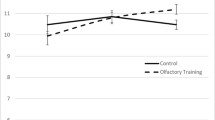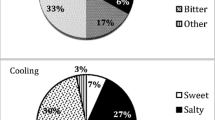Abstract
Introduction
A growing body of research has demonstrated differences in perceptual, conceptual, and language abilities between wine experts and novices. However, it is unclear to what extent these differences are innate or acquired through training. The present study assessed the olfactory and gustatory performance of a group of university blind wine tasters before and after training. Previous research has shown that this training regimen significantly improves blind tasting accuracy, but it remains unknown whether perceptual learning from blind tasting training is generalisable to standard tests of olfactory/gustatory ability.
Methods
Two testing sessions were carried out for the training group (N = 14) as well as for a control group (N = 12) before and after a 5-week training period. In each session, participants underwent olfactory threshold, discrimination, and identification assessments as well as a gustatory sensitivity test.
Results
Olfactory discrimination significantly improved in the training group over the 5-week period, and the training group outperformed controls in olfactory identification in both sessions.
Conclusions
Based on our limited set of data, wine training seems to have improved olfactory discrimination, even though the method of training did not involve odorants used in the discrimination test itself.
Implications
These results reveal that even wine training over a short period seems to make concrete changes to olfactory performance, supporting the idea that generalised perceptual learning can take place for odour discrimination.




Similar content being viewed by others
References
Arvisenet G, Guichard E, Ballester J (2016)Taste-aroma interaction in model wines: effect of training and expertise. Food Qual Prefer 52:211–221
Banks SJ, Sreenivasan KR, Weintraub DM, Baldock D, Noback M, Pierce ME et al (2016) Structural and functional MRI differences in master sommeliers: a pilot study on expertise in the brain. Front Hum Neurosci 10(414):1–12
Bende M, Nordin S (1997) Perceptual learning in olfaction: professional wine tasters versus controls. Physiol Behav 62:1065–1070
Berg HW, Filipello F, Hinreiner E, Webb AD (1955) Evaluation of thresholds and minimum difference concentrations for various constituents of wines. Food Technol 9:23–26
Brand G, Brisson R (2012) Lateralisation in wine olfactory threshold detection: Comparison between experts and novices. Laterality 17:583–596
Brochet F, Dubourdieu D (2001) Wine descriptive language supports cognitive specificity of chemical senses. Brain Lang 77:187–196
Browne JP, Hopkins C, Slack R, Cano SJ (2007) The Sino-Nasal Outcome Test (SNOT): can we make it more clinically meaningful? Otolaryngol Head Neck Surg 136:736–741
Burton N, Flewellen J (2014) The concise guide to wine & blind tasting. Acheron Press, Exeter
Castriota-Scanderbeg A, Hagberg GE, Cerasa A, Committeri G, Galati G, Patria F, Pitzalis S, Caltagirone C, Frackowiak R (2005) The appreciation of wine by sommeliers: a functional magnetic resonance study of sensory integration. NeuroImage 25:570–578
Cavazzana A, Poletti SC, Guducu C, Larsson M, Hummel T (2018)Electro-olfactogram responses before and after aversive olfactory conditioning in humans. Neuroscience 373:199–206
Charness N (1976) Memory for chess positions: resistance to interference. J Exp Psychol Hum Learn Mem 2:641–653
Chollet S, Valentin D, Abdi H (2005) Do trained assessors generalize their knowledge to new stimuli? Food Qual Prefer 16:13–23
Clapperton JF, Piggott JR (1979) Flavour characterization by trained and untrained assessors. J Inst Brew 85:275–277
Croijmans I, Majid A, Simon SA (2016) Not All Flavor Expertise Is Equal: The Language of Wine and Coffee Experts. Plos One 11(6):e0155845
Croijmans I, Speed LJ, Arshamian A, Majid A (2020) Expertise shapes multimodal imagery for wine. Cogn Sci 44:e12842
Croy I, Buschhuter D, Seo HS, Negoias S, Hummel T (2010) Individual significance of olfaction: development of a questionnaire. Eur Arch Otorhinolaryngol 267:67–71
Delon-Martin C, Plailly J, Fonlupt P, Veyrac A, Royet J-P(2013) Perfumers’ expertise induces structural reorganization in olfactory brain regions. NeuroImage 68:55–62
Doty RL, Cameron EL (2009) Sex differences and reproductive hormone influences on human odor perception. Physiol Behav 97:213–228
Findlay CJ, Castura JC, Schlich P, Lesschaeve I (2006) Use of feedback calibration to reduce the training time for wine panels. Food Qual Prefer 17:266–276
Fjaeldstad AW, Fernandes HM (2020) Chemosensory sensitivity after coffee consumption is not static: short-term effects on gustatory and olfactory sensitivity. Foods 9:493–499
Fjaeldstad A, Niklassen AS, Fernandes HM (2018)Re-test reliability of gustatory testing and introduction of the sensitive taste-drop-test. Chem Senses 43:341–346
Gibson EJ (1963) Perceptual learning. Annu Rev Psychol 14:29–56
Haehner A, Mayer A-M, Landis BN, Pournaras I, Lill K, Gudziol V, Hummel T (2009) High test-retest reliability of the extended version of the "Sniffin' Sticks" test. Chem Senses 34:705–811
Heymann H, Ebeler SE (2017) Sensory and Instrumental Evaluation of Alcoholic Beverages. Elsevier, London
Hill DL (2004) Neural plasticity in the Gustatory system. Nutr Rev 62:S208–S241
Hoehl K, Busch-Stockfisch M (2015) The influence of sensory training on taste sensitivity. Effects on sweet and bitter perception over a half-year period. Ernahrungs-Umschau 62:208–215
Honoré-Chedozeau C, Desmas M, Ballester J, Parr WV, Chollet S (2019) Representation of wine and beer: influence of expertise. Curr Opin Food Sci 27:104–114
Hughson AL (2003) Cork and talk: The cognitive and perceptual bases of wine expertise. Dissertation thesis. Australia: University of Sydney
Hughson AL, Boakes RA (2002) The knowing nose: the role of knowledge in wine expertise. Food Qual Prefer 13:463–472
Hummel T, Sekinger R, Wolf SR, Pauli F, Kobal G (1997) ‘Sniffin’ sticks’: Olfactory performance assessed by the combined testing of odor identification, odor discrimination and olfactory threshold. Chem Senses 22:39–52
Hummel T, Rissom K, Reden J, Hähner A, Weidenbecher M, Hüttenbrink KB (2009) Effects of olfactory training in patients with olfactory loss. Laryngoscope 119:496–499
Hummel T, Whitcroft KL, Andrews P, Altundag A, Cinghi C, Costanzo RM, Damm M, Frasnelli J, Gudziol H, Gupta N, Haehner A, Holbrook E, Hong SC, Hornung D, Hüttenbrink KB, Kamel R, Kobayashi M, Konstantinidis I, Landis BN, Leopold DA, Macchi A, Miwa T, Moesges R, Mullol J, Mueller CA, Ottaviano G, Passali GC, Philpott C, Pinto JM, Ramakrishnan VJ, Rombaux P, Roth Y, Schlosser RA, Shu B, Soler G, Stjärne P, Stuck BA, Vodicka J, Welge-Luessen A (2016) Position paper on olfactory dysfunction. Rhinology 56:1–30
Kennedy JL, Hubbard MA, Huyett P, Patrie JT, Borish L, Payne SC (2013)Sino-nasal outcome test (SNOT-22): a predictor of postsurgical improvement in patients with chronic sinusitis. Ann Allergy Asthma Immunol 111:246–251
Li W, Luxenberg E, Parrish T, Gottfried JA (2006) Learning to smell the roses: experience-dependent neural plasticity in human piriform and orbitofrontal cortices. Neuron 52:1097–1108
Mahmut MK, Uecker FC, Göktas Ö, Georgsdorf W, Oleszkiewicz A, Hummel T (2020) Changes in olfactory function after immersive exposure to odorants. J Sens Stud 34:222–228
Majid A, Speed L, Croijmans I, Arshamian A (2017) What makes a better smeller? Perception 46:406–430
Mariño-Sanchez FS, Alobid I, Cantellas S, Alberca C, Guilemany JM, Canals JM, De Haro J, Mullol J (2010) Smell training increases cognitive smell skills of wine tasters compared to the general healthy population. The WINECAT study. Rhinology 48:273–276
Neumann C, Tsioulos K, Merkonidis C, Salam M, Clark A, Philpott C (2012) Validation study of the “Sniffin’ Sticks” olfactory test in a British population: a preliminary communication. Clin Otolaryngol 37:23–27
Owen DH, Machamer PK (1979)Bias-free improvement in wine discrimination. Perception 8:199–209
Parr WV, Heatherbell D, White KG (2002) Demystifying wine expertise: Olfactory threshold, perceptual skill and semantic memory in expert and novice wine judges. Chem Senses 27:747–755
Parr WV, White KG, Heatherbell D (2004) Exploring the nature of wine expertise: What underlies wine experts’ olfactory recognition memory advantage? Food Qual Prefer 15:411–420
Pazart L, Comte A, Magnin E, Millot J-L, Moulin T (2014) An fMRI study on the influence of sommeliers' expertise on the integration of flavor. Front Behav Neurosci 8:358
Peron RM, Allen GL (1988) Attempts to train novices for beer flavor discrimination: a matter of taste. J Gen Psychol 115:403–418
Poupon D, Fernandez P, Frasnelli J (2019) Sommelier students display superior abilities to identify but not to detect or discriminate odors early in their training. Chemosens Percept 125:1763–1769
Rabin MD (1988) Experience facilitates olfactory quality discrimination. Percept Psychophys 44:532–540
Rabin MD, Cain WS (1989) Attention and learning in the perception of odor mixtures. In: Laing DG, Cain WS, McBride RL, Ache BW (eds) Perception of Complex Smells and Tastes. Academic Press, Sydney, pp 173–188
Royet J-P, Plailly J, Saive A-L, Veyrac A, Delon-Martin C (2013) The impact of expertise in olfaction. Front Psychol 4:928
Rumeau C, Nguyen DT, Jankowski R (2016) How to assess olfactory performance with the Sniffin’ Sticks test ®. Eur Ann Otorhinolaryngol Head Neck Dis 133:203–206
Segal J, Pol Roger UK Ltd, Waugh H (2013) Red, Whites & Varsity Blues: 60 Years of the Oxford & Cambridge Blind Wine-Tasting Competition. Pavilion Books, London
Slodoba J (1976) Visual perception of musical notation: registering pitch symbols in memory. Q J Exp Psychol 28:1–16
Sorokowska A, Drechsler E, Karwowski M, Hummel T (2017) Effects of olfactory training: a meta-analysis. Rhinology 55:17–26
Spence C (2020) Perceptual learning in the chemical senses: a review. Food Res Int 123:746–761
Spence C, Wang QJ (2019) Wine expertise: perceptual learning in the chemical senses. Curr Opin Food Sci 27:49–56
Sreenivasan K, Zhuang X, Banks SJ, Mishra V, Yang Z, Deshpande G, Cordes D (2017) Olfactory network differences in master sommeliers: connectivity analysis using granger causality and graph theoretical approach. Brain Connectivity 7:123–136
Sulmont-Rosse C, Maitre I, Amand M, Symoneaux R, Wymelbeke VV, Caumon E, Tavares J, Issanchou S (2015) Evidence for Different Patterns of Chemosensory Alterations in the Elderly Population: Impact of Age Versus Dependency. Chemical Senses 40(3):153–164
Tempere S, Cuzange E, Malak J, Bougeant JC, de Revel G, Sicard G (2011) The training level of experts influences their detection thresholds for key wine compounds. Chemosens Percept 4:99–115
Tempere S, Cuzange E, Bougeant JC, de Revel G, Sicard G (2012) Explicit sensory training improves the olfactory sensitivity of wine experts. Chemosens Percept 5:205–213
Tempere S, Hamtat M-L, de Revel G, Sicard G (2016) Comparison of the ability of wine experts and novices to identify odorant signals: a new insight in wine expertise. Aust J Grape Wine Res 22:190–196
Tempere S, de Revel G, Sicard G (2019) Impact of learning and training on wine expertise: a review. Curr Opin Food Sci 27:98–103
Valentin D, Dacremont C, Cayeux I (2011) Does short-term odour memory increase with expertise? An experimental study with perfumers, flavourists, trained panellists and novices. Flavour and Fragrance Journal 26(6):408–415
Walk RO (1966) Perceptual learning and the discrimination of wines. Psychonomic Science 5(2):57–58
Wang QJ, Prešern D (2018) Does Blind Tasting Work? Investigating the impact of training on blind tasting accuracy and wine preference. J Wine Econ 13:384–393. https://doi.org/10.1017/jwe.2018.36
Wilson DA, Kadohisa M, Fletcher ML (2006) Cortical contributions to olfaction: plasticity and perception. Semin Cell Dev Biol 17:462–470
Wysocki CJ, Dorries KM, Beauchamp GK (1989) Ability to perceive androstenone can be acquired by ostensibly anosmic people. Proc Natl Acad Sci U S A 86:7976–7978
Zucco GM, Carassai A, Baroni MR, Stevenson RJ (2011) Labelling, identification, and recognition of wine-relevant odorants in expert sommeliers, intermediates, and untrained wine drinkers. Perception 40:598–607
Acknowledgments
The authors would like to thank members of the Oxford University Blind Tasting Society for their support and participation in the research.
Funding
This work has been supported by an AUFF starting grant from Aarhus University received by the first author. The last author was partly funded by Arla and Central Region Denmark.
Author information
Authors and Affiliations
Corresponding author
Ethics declarations
Conflict of Interest
The authors declare that they have no conflict of interest.
Disclaimer
The sponsors had no say, roles, or responsibilities in relation to the study, including (but not limited to) study design, data collection, management, analysis, interpretation of data, writing of the manuscript, or the decision to publish.
Additional information
Publisher’s Note
Springer Nature remains neutral with regard to jurisdictional claims in published maps and institutional affiliations.
Rights and permissions
About this article
Cite this article
Wang, Q.J., Fernandes, H.M. & Fjaeldstad, A.W. Is perceptual learning generalisable in the chemical senses? A longitudinal pilot study based on a naturalistic blind wine tasting training scenario. Chem. Percept. 14, 64–74 (2021). https://doi.org/10.1007/s12078-020-09284-x
Received:
Accepted:
Published:
Issue Date:
DOI: https://doi.org/10.1007/s12078-020-09284-x




